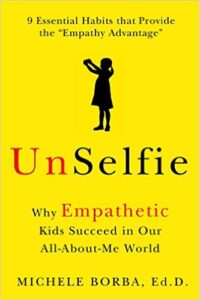REALITY CHECK: Now that the fall semester is underway, it won’t be long until your child’s progress report arrives, revealing not only their academic proficiency, but their conduct report as well. Studies confirms that children today are more self-centered than ever—and it’s a big problem. It’s why I urge parents to recognize the importance of raising empathic kids, challenge them to teach their children about caring and kindness today, and then take The Empathy Parent Pledge which follows.
An Empathy Pledge for Worried Parents
Do your kids really care about others? All parents want to be able to give a resounding yes without hesitation. Yet, if we’re honest, too many of us have to stop and think about it—and when we do, we often reach a troubling conclusion.
America is raising a generation of kids who can’t see past their smartphones and jam-packed schedules of “enriching” activities to notice the human beings in front of them who need kindness and friendship. (Real friendship, not the Instagram version.) In fact, studies show that today’s teens are 40 percent less empathetic than those of 30 years ago. Could it be that we’ve focused too much on grades and grit and neglected the other side of the report card—our kids’ ability to connect and get along with others?
To recognize this empathy deficit in young people in general is one thing. To see it in your own child is quite another.
If you’re deeply troubled by the realization that your kids don’t seem to care, you’re not alone. Over and over, researchers are finding that empathy is THE cornerstone for becoming a happy, well-adjusted, successful adult. Studies show without a doubt that possessing empathy makes you more likable, more employable, a better leader, more conscience-driven…and it even increases your life span.
Even parents who haven’t read the research instinctively realize that kids need the capacity to care. They’re living the problem. They know exactly how bad it feels. They deplore the endless duck-face selfies, the disrespectful remarks, the materialism, the unwillingness to help with chores, the elbowing-to-the-front competitiveness. And yet despite their best efforts, they simply can’t move the needle on their children’s behavior.
No parent wants to raise an uncaring child. Yet we feel helpless not to because we don’t raise our kids in a vacuum. There are very real forces out there crushing the empathy out of our kids: social media, the bad influence of kids whose parents don’t hold them accountable, our own tendency to helicopter parent. But there are some things we CAN control—and how we reward and recognize success in our kids is a great place to start.
That’s why I’m urging you to take the empathy pledge: “This year I will pay more attention to the OTHER side of the report card.”
I’m referring here to your child’s literal conduct grade, yes, but not just that. I’m talking about whether your child is a bully or stands up for others, whether he snickers at mean-spirited jokes or denounces them, whether she works together with peers or undermines them, whether she shares what she has freely or hoards it.
Yes, academics are still the metric by which the world judges success. I get that and I’m sure you do, too. But this lopsidedness is beginning to change. In fact, some schools, including Harvard, are reshaping their admissions processes to reduce some of the academic pressure and encourage service, caring, and reflection.
I am hopeful that such moves to encourage empathy will multiply. We need to fan the sparks we’re seeing until they catch fire and spread. We need a national conversation about moving our focus to the other side of the report card. Like all conversations, it starts at home…and I can’t think of a better time to start than right now. There has never been a time when our children need to learn empathy.
A few tips to keep in mind as you take The Empathy Parent Pledge
Stop over-emphasizing straight A’s.
Your kids know when you value academic success over all else. When you harp on grades and test scores and rarely mention sharing, caring, and kindness, they get the message. (There’s a Harvard study that backs me up!) When your child walks in the door, what’s your first question? If it’s: “What grade did you get?” it may be time to ask: “What caring thing did you do?”
…And start talking up empathy.
Model caring behavior for your child (of course) but also talk about it. Explain what empathy is, what it looks like in action, and what she can do or say to express it. And tell her in no uncertain terms that you will be watching how she behaves toward siblings, friends, teachers, parents, and even strangers.
Don’t just listen to what they say; watch what they do.
Your child likely has two personas: the one he shows to friends and on social media and the one he shows to you and/or his teachers. Sure, he’ll tell you that he’s being kind and inclusive, but don’t take his word for it. Observe him when he isn’t aware. Listen to how other people describe your child. Help him develop a Caring Mindset so he does the caring thing without your reminders or presence.
Put kids in situations where they can practice empathy.
Empathy is a skill set, one that can be taught and nurtured at any age. Get kids involved in a service organization or just spend time baking cookies and, together, deliver them to an elderly neighbor. Make empathy-building a regular part of their life. You want to hardwire it.
When you see those traits like caring, kindness, and thoughtfulness…acknowledge it.
Don’t give your child money or “stuff” in exchange for showing empathy. (Talk about sending the wrong message!) Do praise her, hug her, or maybe even take her out for an ice cream date and tell her how proud you are to be the mom of such a caring child.
But don’t give your child money or “stuff” in exchange for showing empathy. It actually decreases altruism!)
Start putting pressure on schools to emphasize empathy.
It’s possible your child’s school no longer measures conduct at all—or at least it’s seldom mentioned in the classroom. If this is going to change, it’s up to you.
When parents band together, we have tremendous power. MADD, for instance, dramatically lowered drunk driving rates. When parents set out to bring up our nation’s math and science scores a couple decades ago, they came up. What we focus on gets done—so let’s focus on raising a generation of kind, caring, empathetic, successful kids. Here’s a pledge to help us all get started. Please pass it on!
 The 2016 Parent Empathy Pledge
The 2016 Parent Empathy Pledge
This year I will pay attention to the other side of the report card.
I’ll reward kindness. Caring. Sharing. Teamwork.
I’ll make it clear that while grades do matter, empathy matters too.
I’ll teach my child to encourage the classmate who struggles,
To cheer on the kid who missed the goal,
To pick the kid who never gets picked,
To make friends outside the “exclusive” group,
To sit with the kid who’s shy or awkward or different,
To comfort someone who is having a bad day,
To notice when kids are hurting and try their best to help,
And I, as a parent, pledge to raise an Unselfie who thinks “we,” not “me.”
I’ll set the right example for my child in all I do and say,
Because I can’t talk anyone into caring…I can only walk the path and hope they follow.
By Michele Borba, Ed.D., author of UnSelfie: Why Empathetic Kids Succeed in Our All-About-Me World.
 “Her thought-provoking and practical book may well tip over the parenting priority applecart – and rightly so.” – PUBLISHER’S WEEKLY (Starred Review)
“Her thought-provoking and practical book may well tip over the parenting priority applecart – and rightly so.” – PUBLISHER’S WEEKLY (Starred Review)
“Michele Borba has written a game-changing guide showing why nurturing empathy in our children isn’t optional-it’s essential.” – PHILIP ZIMBARDO, professor emeritus of psychology, Stanford University
“Nobody on the planet is better than Michele Borba at showing you how to put empathy into action.” – JACK CANFIELD, coauthor of Chicken Soup of the Soul
This book offers a roadmap to a much brighter future.” – DACHER KELTER director of the Greater Good Science Center
“I have never, ever read a book that combines solid research on a timely and critical subject-the importance of promoting empathy.” – ELLEN GALINSKY, author of Mind in the Making

